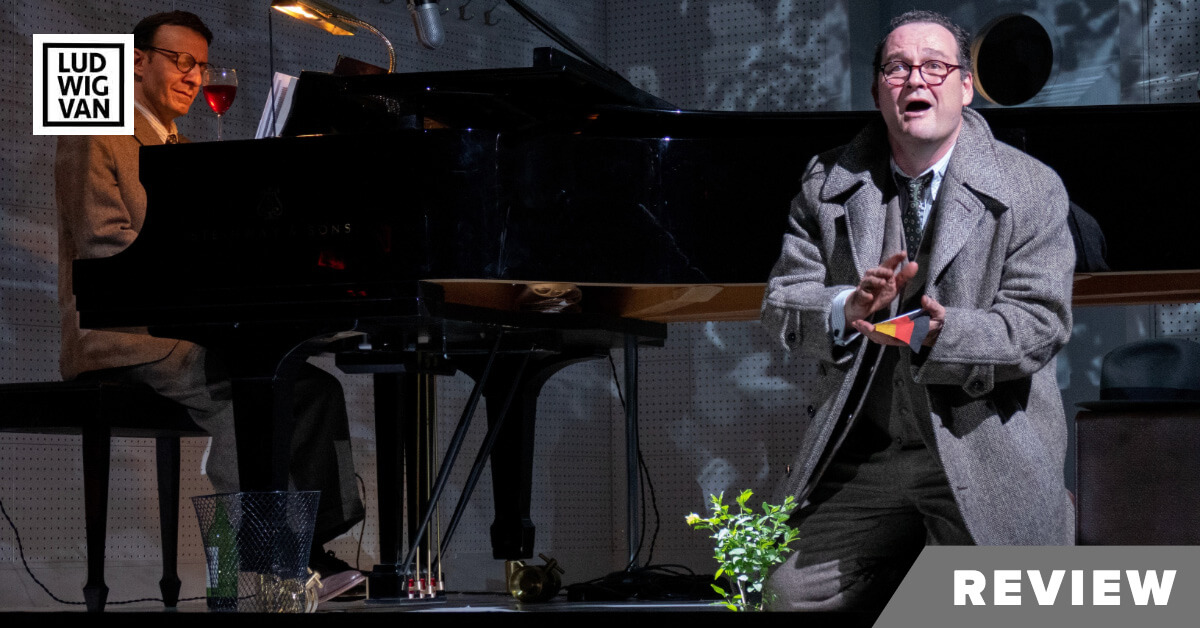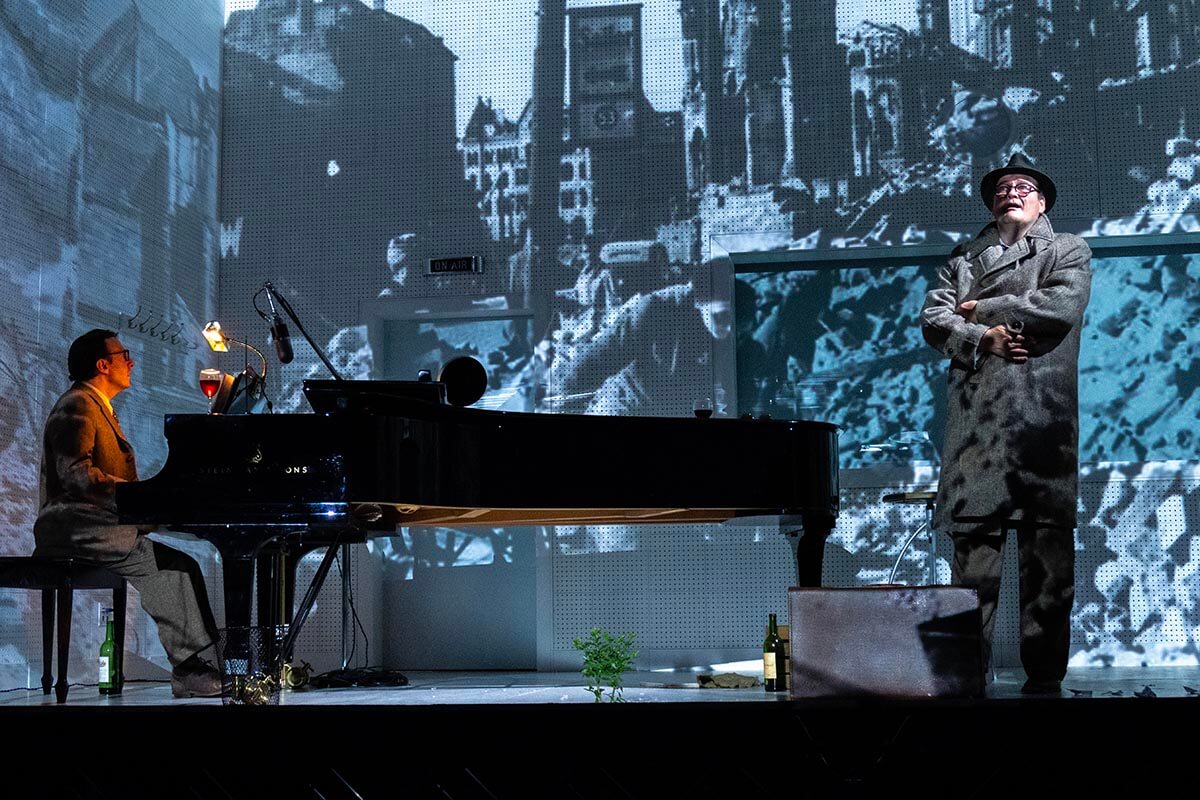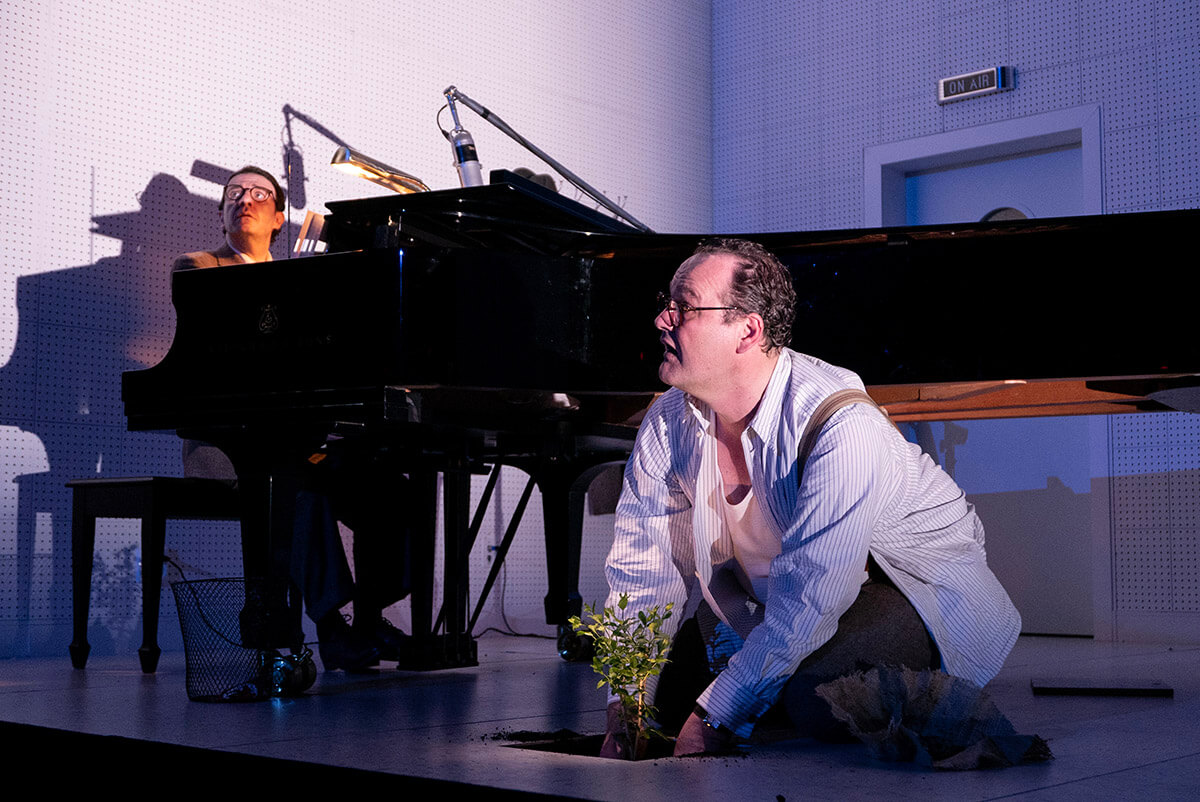
Luminato Festival, Soundstreams & Pinkhouse Productions/Hell’s Fury, The Hollywood Songbook, music by Hanns Eisler, devised and directed by Tim Albery, performed by baritone Russell Braun and pianist Serouj Kradjian, Harbourfront Centre Theatre, June 19 to 23. Tickets available at luminato.com.
The world premiere of Hell’s Fury, The Hollywood Songbook was greeted with an instantaneous standing ovation and a heartfelt chorus of bravi. The production is built around Hanns Eisler’s iconic Hollywooder Liederbuch, and although the song cycle was composed between 1942 and 1943, sadly, the dark themes of these lieder resonate in today’s troubled times. To say that this affecting new music theatre packs an emotional wallop is an understatement.
German composer Eisler (1898-1962), like many of his Jewish and/or Communist artistic colleagues who fled the Nazi terror, ended up in Los Angeles working in the film industry. Eisler began his career as a classical composer who had studied with Arnold Schoenberg in Vienna. In his adopted homeland, Eisler became a purveyor of music scores for movies, two of which were nominated for Academy Awards (Fritz Lang’s Hangmen Also Die!, 1944, and Clifford Odets’ None but the Lonely Heart, 1945). As an amusing aside, Berthold Brecht co-wrote the screenplay with Lang, and is listed in the credits as Bert Brecht.
During the 1920s, Eisler had relocated from Vienna to the hotbed of creativity that was Weimar Republic Berlin, and it was there that he formed both a close personal and professional association with Brecht, one of Germany’s most esteemed poet, playwright and lyricist, and a fellow Marxist. While Eisler’s movie scores were very public expressions of his creativity, this collection of roughly forty-seven art songs was a very personal journey of self-expression. The songs are mostly set to poetry by Brecht, (with some additional texts, including Eisler’s own), and reflect the melancholy of a refugee in exile, raging at the Nazi monsters on one hand for destroying a vibrant civilization, countered by a subdued nostalgia for the German culture that had once been. The texts also skewer the superficiality that these Marxists saw embedded in Hollywood glitz and American capitalism. The dark texts are filled with despair, anger and pain, and one Brecht poem is actually called “About Suicide”. With great irony, Eisler called this noir song cycle Hollywooder Liederbuch or Hollywood Songbook.

While there is a general melancholy commonality that the songs share, Eisler’s rambling cycle is, in reality, a loose collection without a strongly defined narrative or thematic throughline that links the texts tightly together. As a result, performances of the Hollywood Songbook are always different in terms of texts chosen and performance order. In devising Eisler’s Songbook as music theatre, director Tim Albery chose about thirty-five songs, which he has grouped to take us on a journey through Eisler’s life. He has also added in small sections of spoken text taken from Eisler’s own words. It begins in a Los Angeles hotel room in 1942, and ends with Eisler’s death in 1962, touching on important milestones of his life in between.
At this point we should mention that Eisler’s successful Hollywood career was cut short when he was deported from the United States for his Communist affiliation by the House Un-American Activities Committee. He settled in East Berlin, even composing the DDR’s new national anthem. When his 1952 libretto for his opera Johannes Faust ran afoul of the East German Communist Party, his career was virtually over. Eisler felt he had been silenced. (He was accused of denigrating Goethe’s cultural icon by portraying Faust as betraying the working classes.) In death, however, Eisler was much honoured.
Albery is one of my favourite opera stage directors because he always has a clear-eyed vision that serves the composer, and doesn’t junk up the stage with gratuitous symbolism. Michael Levine’s impressive set is a realistic recording studio, replete with a grand piano, emblematic of Eisler’s life as a Hollywood film composer. Throughout the work, Cameron Davis’ projections depict locale, such as palm trees and swimming pools for Los Angeles, the fields and streams of a blissfully bucolic pre-Nazi Germany, and historical events such as marauding Nazi armies. In fact, the use of designated projections in The Hollywood Songbook is one of the most clever I’ve seen in terms of supporting text. Thomas C. Hase’s atmospheric lighting is stunning and effective, especially his use of colours. Everything about this production is a class act.

Baritone Russell Braun and pianist Serouj Kradjian are both dressed in the same 1940s suit and eyeglasses. They do not directly communicate with each other, but they both drink wine, for example, and take off their jackets, albeit at different times. Clearly Albery is creating the illusion that they are both aspects of Eisler, one representing the successful composer, the other expressing the torments of his life.
Braun keeps getting better with age as an acting singer, although I wish his English diction was a bit sharper. He has always had the most mellifluous voice cocooned in sweetness, but in this performance he manipulates the nuance and cadence of his singing to an astonishing degree. He pulls back in hushed agony, he rises to despairing falsetto, he declaims like an old world prophet. In short, Braun never takes the wrong tone in terms of self-expression, swinging as he does between extreme moods, from white-hot rage, to maudlin self-pity, to quiet reflection. Albery has him moving comfortably about the set using props as needed. He plants a tree in the floor tiles to remind him of home. He dons period sunglasses while mocking Hollywood with graphic sexuality in the song “The city is named after the angels”. And always on stage there is the battered brown suitcase symbolizing his peripatetic existence. Braun carries it in, but Kradjian carries it off.

As an accompanist, Kradjian performs with exquisite delicacy, leaving the thumping and crashing to the abrupt endings that Eisler gave to many of the songs. He is a smooth piano man, and there is an ease of tempi. The best way to describe his playing is gliding between the notes. While none of the songs are actually twelve-tone in the Schoenberg mode, they also have no discernable melody. I call this school modernist, although expressionism, impressionism and even singspiel apply to Eisler’s musical style which is at all times dramatic. It is Kradjian’s cinematic piano with its rippling up and down chords that anchors the songs, allowing Braun to layer the text over the music. Together, player and singer form a passionate, symbiotic joining.
Albery is a detail man, using subtleties to enrich his productions. For example, surtitles are used when Braun is singing in German, but Albery plays with the font. Suddenly the words “refugee” and “hoping” become huge, highlighting the composer’s angst. In another instance, during a sardonic song about giving a son a brown shirt, the projection of marching Wehrmacht troops begins on Braun’s sleeve, grows to cover his chest, and then explodes into an enormous cover of the whole back wall. And then there are the little flags — Weimar, Nazi, American and DDR — that make appearances as needed, and act like a trail of tears. It is these little surprises that give Albery productions their jolts of recognition.
To end, we need to explain the Hell’s Fury of the title. Braun as Eisler tells the joke. The transliteration of “Hollywood” into German is “Hölle Wut”, which sounds like the English, but in reality means Hell’s Fury. In light of the wellspring of this piece, it is a brilliant title, and I am predicting without reservation that Hell’s Fury, The Hollywood Songbook, this profoundly provocative and imaginatively original Canadian music theatre, will become a staple on the international music scene.
LUDWIG VAN TORONTO
Want more updates on classical music and opera news and reviews? Follow us on Facebook, Instagram or Twitter for all the latest.



